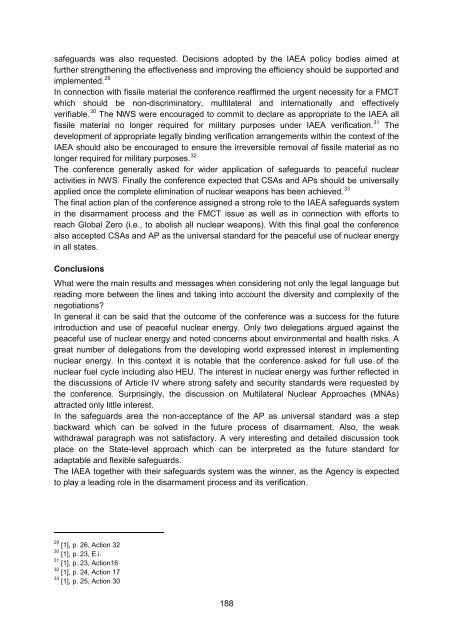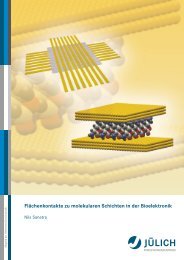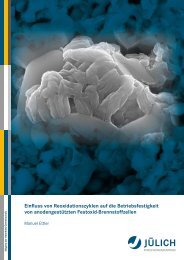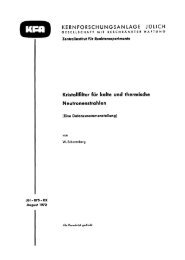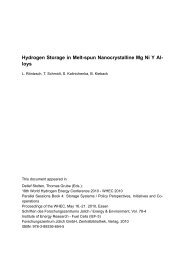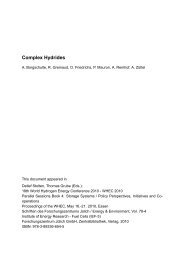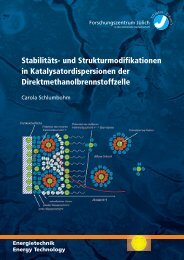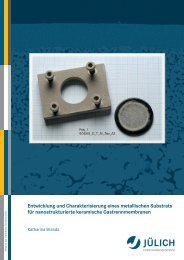Annual Report 2009/2010 - JUWEL - Forschungszentrum Jülich
Annual Report 2009/2010 - JUWEL - Forschungszentrum Jülich
Annual Report 2009/2010 - JUWEL - Forschungszentrum Jülich
Create successful ePaper yourself
Turn your PDF publications into a flip-book with our unique Google optimized e-Paper software.
safeguards was also requested. Decisions adopted by the IAEA policy bodies aimed at<br />
further strengthening the effectiveness and improving the efficiency should be supported and<br />
implemented. 29<br />
In connection with fissile material the conference reaffirmed the urgent necessity for a FMCT<br />
which should be non-discriminatory, multilateral and internationally and effectively<br />
verifiable. 30 The NWS were encouraged to commit to declare as appropriate to the IAEA all<br />
fissile material no longer required for military purposes under IAEA verification. 31 The<br />
development of appropriate legally binding verification arrangements within the context of the<br />
IAEA should also be encouraged to ensure the irreversible removal of fissile material as no<br />
longer required for military purposes. 32<br />
The conference generally asked for wider application of safeguards to peaceful nuclear<br />
activities in NWS. Finally the conference expected that CSAs and APs should be universally<br />
applied once the complete elimination of nuclear weapons has been achieved. 33<br />
The final action plan of the conference assigned a strong role to the IAEA safeguards system<br />
in the disarmament process and the FMCT issue as well as in connection with efforts to<br />
reach Global Zero (i.e., to abolish all nuclear weapons). With this final goal the conference<br />
also accepted CSAs and AP as the universal standard for the peaceful use of nuclear energy<br />
in all states.<br />
Conclusions<br />
What were the main results and messages when considering not only the legal language but<br />
reading more between the lines and taking into account the diversity and complexity of the<br />
negotiations?<br />
In general it can be said that the outcome of the conference was a success for the future<br />
introduction and use of peaceful nuclear energy. Only two delegations argued against the<br />
peaceful use of nuclear energy and noted concerns about environmental and health risks. A<br />
great number of delegations from the developing world expressed interest in implementing<br />
nuclear energy. In this context it is notable that the conference asked for full use of the<br />
nuclear fuel cycle including also HEU. The interest in nuclear energy was further reflected in<br />
the discussions of Article IV where strong safety and security standards were requested by<br />
the conference. Surprisingly, the discussion on Multilateral Nuclear Approaches (MNAs)<br />
attracted only little interest.<br />
In the safeguards area the non-acceptance of the AP as universal standard was a step<br />
backward which can be solved in the future process of disarmament. Also, the weak<br />
withdrawal paragraph was not satisfactory. A very interesting and detailed discussion took<br />
place on the State-level approach which can be interpreted as the future standard for<br />
adaptable and flexible safeguards.<br />
The IAEA together with their safeguards system was the winner, as the Agency is expected<br />
to play a leading role in the disarmament process and its verification.<br />
29 [1], p. 26, Action 32<br />
30 [1], p. 23, E.i.<br />
31 [1], p. 23, Action16<br />
32 [1], p. 24, Action 17<br />
33 [1], p. 25, Action 30<br />
188


